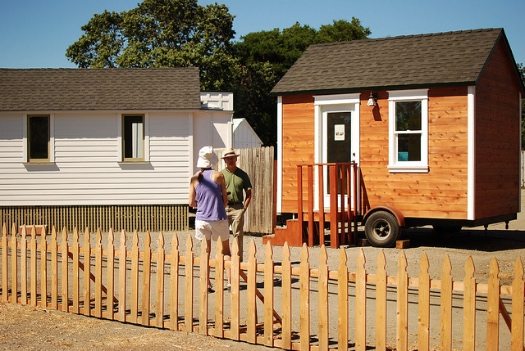
May 17, 2017; Tennessean
The Village at Glencliff, an innovative effort to develop a tiny-home community as an answer to homelessness, continues to face opposition as it moves forward.
As described in an earlier NPQ newswire, Glencliff is designed to house up to 20 people at great risk of dying if they remain on the streets. Opponents are claiming that it was a mistake to approve the project and are asking the Nashville Metro Board of Zoning Appeals to deny approval to any further development.
Over the last several months, the project has driven a wedge between neighbors in the Glencliff area. It’s spurred debate and argument on social media, and spilled offline into a couple of community meetings, as well as a Sunday morning protest of the project and a counter-demonstration outside the church.
The project is a joint effort by Open Table, a local social service agency, and the Glencliff United Methodist Church, which will build the tiny-home community on six acres of undeveloped land on the church’s property. From the perspective of church leaders, the project is a clear expression of their religious mission. Rev. Sandra Griggs, pastor of Glencliff United Methodist, told the Tennessean that the project resonates with the congregation: “It’s part of their faith to take care of each other and to share what they have. They have this piece of underutilized property. It’s a part of who we are as a Methodist church. It’s the call to love God and neighbor.”
According to the Tennessean, when it approved the project, the zoning board relied on both federal and state legislation that requires zoning laws to respect religious expression:
Sign up for our free newsletters
Subscribe to NPQ's newsletters to have our top stories delivered directly to your inbox.
By signing up, you agree to our privacy policy and terms of use, and to receive messages from NPQ and our partners.
The federal Religious Land Use and Institutionalized Persons Act[,] also called RLUIPA…protect[s] places of worship from discrimination and burdensome zoning rules. The Tennessee Religious Restoration Act…which mandates that local governments cannot curtail religious exercise when it applies land use regulations, offers stronger protections than the federal one.
Yesterday, the board was scheduled to hear an appeal from the Memphis Metro Council member who represents the neighborhood where the project is located. Reflecting opposition from some of his constituents, he sees the project as a social service program sponsored by Open Table, and therefore one not permitted under the city’s zoning ordinances.
Opponents have focused their objections on process issues. Rather than consider this a church project, zoning officials should have treated it as a request for a zoning variance by a social service organization and required Open Table to work with the community to reach a compromise before granting approval.
Dayle Ward, who has lived a little more than a mile from the church for 14 years, said her biggest problem with the project is the lack of community input. She also feels the planning for it has been haphazard. “What they did was rather than reaching out to the community they did all of this behind our backs,” Ward said. “They dumped it in our lap and basically said, ‘You have to accept it.’”
When the zoning appeal is heard, the crux of the matter will be whether the project belongs to the church or to Open Table.—Martin Levine













